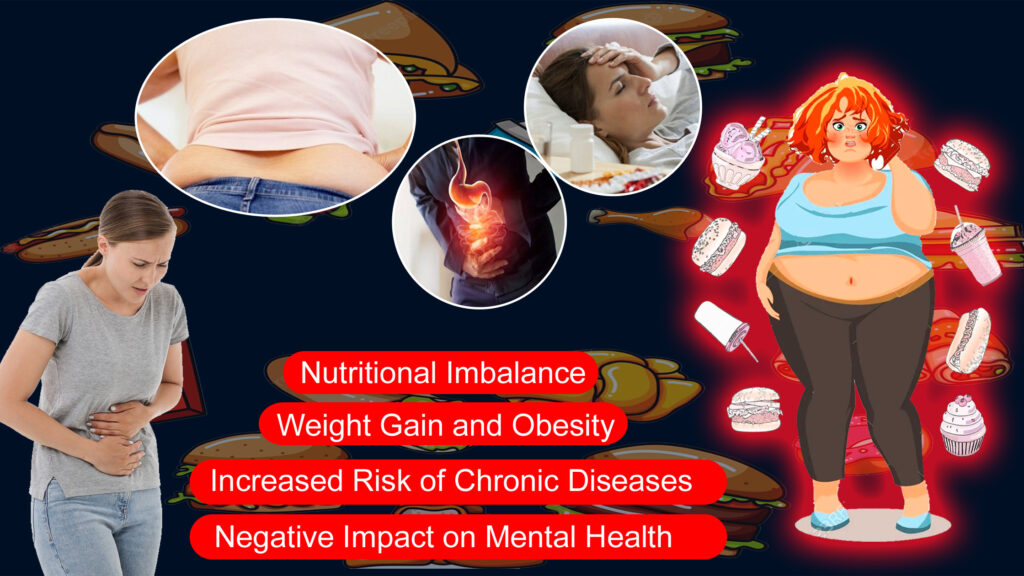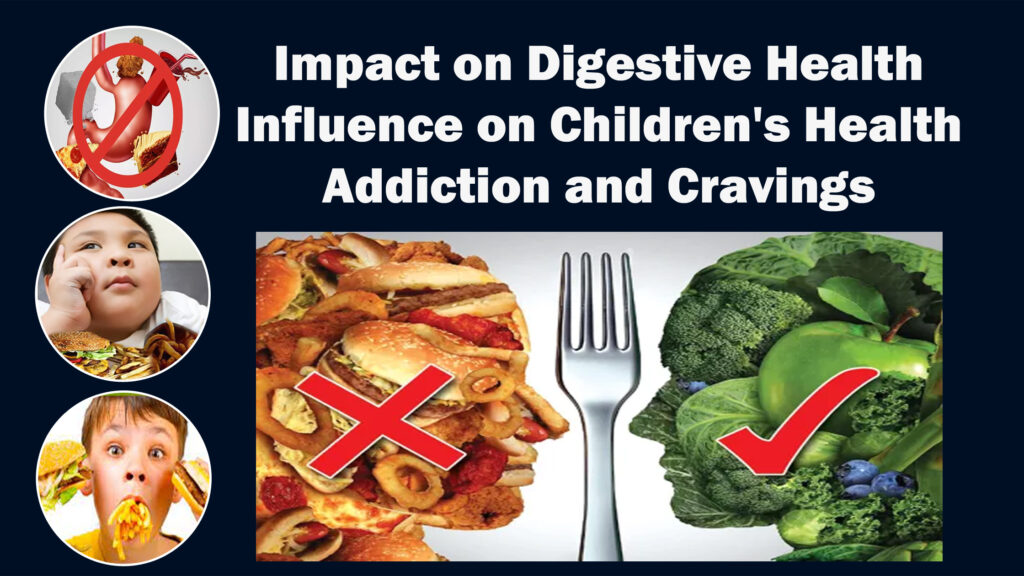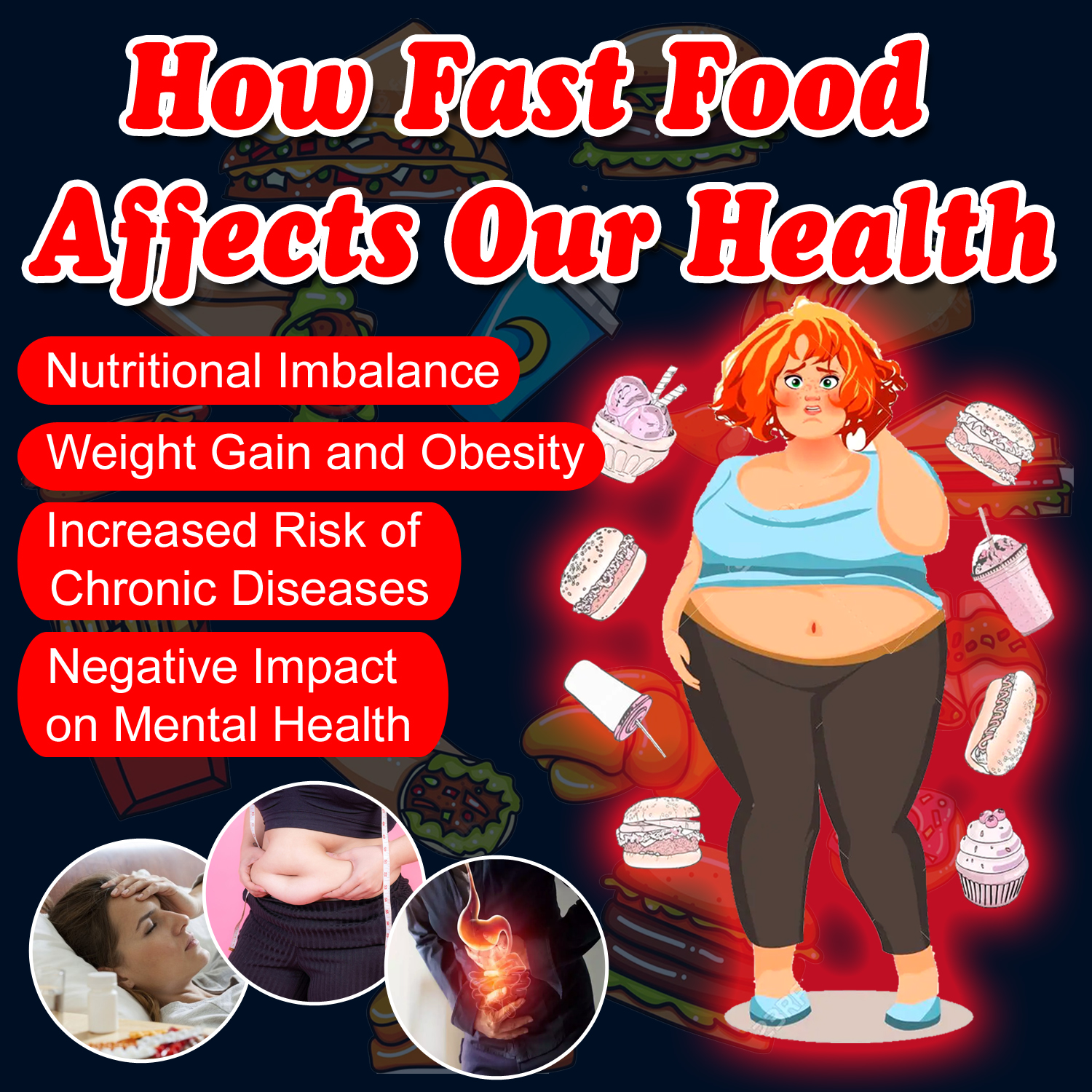In our fast-paced modern world, convenience often takes precedence over health. Fast food establishments have become ubiquitous, offering quick and easily accessible meals. How Fast Food Affects Our Health. However, behind the convenience lies a hidden truth that has dire implications for our health. This blog post aims to shed light on how fast food affects our well-being and why it’s crucial to be mindful of its consequences.
How Fast Food Affects Our Health
Nutritional Imbalance:
Fast food is notorious for its poor nutritional profile. It tends to be high in calories, unhealthy fats, sodium, and added sugars while lacking essential nutrients like fiber, vitamins, and minerals. Regularly consuming such foods can lead to a range of health problems, including obesity, heart disease, diabetes, and nutrient deficiencies.
Weight Gain and Obesity:
The high calorie content of fast food, coupled with its low nutritional value, can contribute to weight gain and obesity. These conditions increase the risk of numerous health complications, such as high blood pressure, stroke, certain cancers, and joint problems. Fast food often contains large portion sizes, which can encourage overeating and disrupt our body’s natural hunger and satiety signals.
Increased Risk of Chronic Diseases:
Consuming fast food on a regular basis has been linked to an increased risk of chronic diseases. Diets rich in unhealthy fats and excessive calories can lead to elevated cholesterol levels, atherosclerosis, and an increased likelihood of developing cardiovascular diseases. Similarly, the high sugar content in many fast food items contributes to insulin resistance and can pave the way for the onset of type 2 diabetes.
Negative Impact on Mental Health:
While the physical health implications of fast food consumption are well-known, its impact on mental health is often overlooked. Numerous studies have shown a correlation between fast food intake and an increased risk of depression, anxiety, and poor overall mental well-being. The lack of essential nutrients, such as omega-3 fatty acids and antioxidants, combined with the potential harmful effects of additives, can influence brain function and mood.
Unhealthy Ingredients and Additives:
Fast food often contains a plethora of unhealthy ingredients and additives. Trans fats, commonly found in fried fast food items, have been strongly linked to heart disease. Additionally, fast food may contain artificial preservatives, flavor enhancers, and food colorings, which can have detrimental effects on our health. These additives have been associated with allergies, hyperactivity in children, and an increased risk of certain cancers.
While the convenience of fast food is tempting, it is essential to recognize the impact it can have on our health. Regularly consuming fast food can lead to nutritional imbalances, weight gain, increased risk of chronic diseases, and negative effects on mental well-being. However, making healthier choices doesn’t mean completely giving up fast food. Opting for healthier alternatives, such as grilled options instead of fried, choosing salads over burgers, and moderating portion sizes, can make a significant difference.
To prioritize our health, we must strive for a balanced diet rich in whole foods, including fruits, vegetables, lean proteins, and whole grains. By understanding the consequences of fast food consumption, we can make informed choices and embrace a healthier lifestyle, ensuring a brighter, more wholesome future for ourselves and future generations.

How Fast Food Affects Our Health
- Impact on Digestive Health: Fast food is often low in fiber, which is essential for a healthy digestive system. This lack of fiber can lead to constipation, irregular bowel movements, and an increased risk of gastrointestinal issues. Additionally, fast food items are typically high in sodium, which can contribute to bloating and water retention, further disrupting digestive health.
- Influence on Children’s Health: Fast food consumption among children has become a significant concern. Regularly indulging in fast food can contribute to childhood obesity, poor growth and development, and an increased risk of developing unhealthy eating habits that persist into adulthood. Parents and caregivers play a crucial role in educating children about the importance of a balanced diet and making healthier food choices.
- Addiction and Cravings: Fast food is designed to be addictive. It often contains high levels of salt, sugar, and unhealthy fats that stimulate pleasure centers in the brain, leading to cravings and a desire for more. This addictive nature can make it challenging to break the cycle of fast food consumption, further perpetuating its detrimental effects on health.
- Environmental Impact: Fast food production and consumption contribute to environmental degradation. The livestock industry, which supplies meat for fast food chains, is a significant contributor to greenhouse gas emissions and deforestation. Additionally, the excessive packaging and waste generated by fast food establishments contribute to pollution and landfill accumulation. Opting for more sustainable and environmentally friendly food choices can help mitigate these issues.
- Importance of Education and Awareness: Raising awareness about the health consequences of fast food is crucial. Promoting nutritional education in schools, workplaces, and communities can empower individuals to make informed choices about their diet. Encouraging the food industry to provide healthier options and transparent nutritional information can also help individuals make better decisions when dining out.

In a society where time is of the essence, fast food may seem like a convenient solution. However, its impact on our health is undeniable. By understanding the nutritional deficiencies, weight gain, chronic disease risks, and mental health implications associated with fast food consumption, we can take proactive steps towards a healthier lifestyle. Choosing whole, unprocessed foods and embracing home-cooked meals can provide the nutrients our bodies need while reducing the harmful effects of fast food. Let us prioritize our health and well-being by making mindful choices and fostering a culture that values nutritious food for ourselves and future generations.



